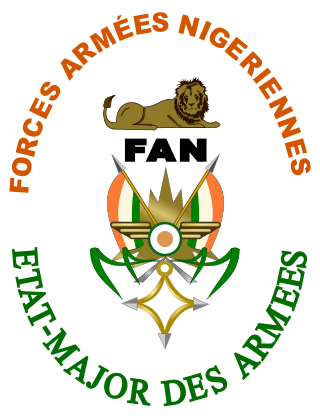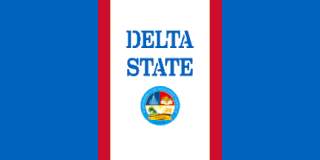Telecommunications in Niger include radio, television, fixed and mobile telephones, and the Internet.

The Niger Armed Forces (FAN) includes military armed force service branches, paramilitary services branches and the National Police. The Niger Army, Niger Air Force and the National Gendarmerie of Niger are under the Ministry of Defense whereas the National Guard of Niger and the National Police fall under the command of the Ministry of Interior. With the exception of the National Police, all military and paramilitary forces are trained in military fashion. The President of Niger is the supreme commander of the entire armed forces.

Aspergillus niger is a mold classified within the Nigri section of the Aspergillus genus. The Aspergillus genus consists of common molds found throughout the environment within soil and water, on vegetation, in fecal matter, on decomposing matter, and suspended in the air. Species within this genus often grow quickly and can sporulate within a few days of germination. A combination of characteristics unique to A. niger makes the microbe invaluable to the production of many acids, proteins and bioactive compounds. Characteristics including extensive metabolic diversity, high production yield, secretion capability, and the ability to conduct post-translational modifications are responsible for A. niger's robust production of secondary metabolites. A. niger's capability to withstand extremely acidic conditions makes it especially important to the industrial production of citric acid.

The Niger Delta Basin, also referred to as the Niger Delta province, is an extensional rift basin located in the Niger Delta and the Gulf of Guinea on the passive continental margin near the western coast of Nigeria with suspected or proven access to Cameroon, Equatorial Guinea and São Tomé and Príncipe. This basin is very complex, and it carries high economic value as it contains a very productive petroleum system. The Niger delta basin is one of the largest subaerial basins in Africa. It has a subaerial area of about 75,000 km2, a total area of 300,000 km2, and a sediment fill of 500,000 km3. The sediment fill has a depth between 9–12 km. It is composed of several different geologic formations that indicate how this basin could have formed, as well as the regional and large scale tectonics of the area. The Niger Delta Basin is an extensional basin surrounded by many other basins in the area that all formed from similar processes. The Niger Delta Basin lies in the south westernmost part of a larger tectonic structure, the Benue Trough. The other side of the basin is bounded by the Cameroon Volcanic Line and the transform passive continental margin.

Onitsha is a city located on the eastern bank of the Niger River, in Anambra State, Nigeria. A metropolitan city, Onitsha is known for its river port and as an economic hub for commerce, industry, and education. It hosts the Onitsha Main Market, the largest market in Africa in terms of geographical size and volume of goods.

Delta State is a state in the South-South geopolitical zone of Nigeria. Named after the Niger Delta—a large part of which is in the state—the state was formed from the former Bendel State on August 27, 1991. Bordered on the north by Edo State, the east by Anambra and Rivers States, and the south by Bayelsa State while to the west is the Bight of Benin which covers about 160 kilometres of the state's coastline. The State was initially created with 12 local government areas in 1991 which was later extended to 19 and now has 25 local government areas. Asaba as its state capital is located along the River Niger on the northeastern end of the State, while the state's economic centre is Warri on the southwestern coastline.

The sable antelope is an antelope which inhabits wooded savanna in East and Southern Africa, from the south of Kenya to South Africa, with a separate population in Angola.

Aspergillus is a genus consisting of several hundred mold species found in various climates worldwide.

Bayelsa is one of the states in the South-South region of Nigeria, located in the core of the Niger Delta region. Bayelsa State was created in 1996 and was carved out from Rivers State, making it one of the newest states in the federation. Yenagoa is the capital city of Bayelsa State with most parts to have fallen within the high-risk of floods, suspects to occur annually. It shares a boundary with Rivers State to the East and Delta State to the west, with the waters of the Atlantic Ocean dominating its southern borders. It has a total area of 10, 773 km2. The state comprises eight Local Government Areas. they are Ekeremor, Kolokuma/Opokuma, Yenagoa, Nembe, Ogbia, Sagbama, Brass and Southern Ijaw. The state shares borders with Rivers State, of which it was formerly part, and Delta State.
Environmental issues in the Niger Delta are caused by its petroleum industry. The delta covers 20,000 km2 (7,700 sq mi) within wetlands of 70,000 km2 (27,000 sq mi) formed primarily by sediment deposition. Home to 20 million people and 40 different ethnic groups, this floodplain makes up 7.5% of Nigeria's total land mass. It is the largest wetland and maintains the third-largest drainage basin in Africa. The Delta's environment can be broken down into four ecological zones: coastal barrier islands, mangrove swamp forests, freshwater swamps, and lowland rainforests. Fishing and farming are the main sources of livelihoods for majority of her residents.

Education in Niger, as in other nations in the Sahelian region of Africa, faces challenges due to poverty and poor access to schools. Although education is compulsory between the ages of seven and fifteen, with primary and secondary school leading into optional higher education, Niger has one of the lowest literacy rates in the world. With assistance from external organizations, Niger has been pursuing educational improvement, reforming how schools utilize languages of instruction, and exploring how the system can close gender gaps in retention and learning.

This is a survey of the postage stamps and postal history of Niger, a former French colony that obtained independence in 1960.

Protolophus is a genus of harvestmen in the family Protolophidae from the Western US.
Colotis halimede, the yellow patch tip or yellow patch white, is a butterfly in the family Pieridae. It is found in Senegal, Mali, Nigeria, Niger, Sudan, Uganda, Ethiopia, Djibouti, Arabia, Somalia, Kenya, Tanzania and North Africa. The habitat consists of dry savanna.
iNaturalist is a social network of naturalists, citizen scientists, and biologists built on the concept of mapping and sharing observations of biodiversity across the globe. iNaturalist may be accessed via its website or from its mobile applications. As of 21 September 2022, iNaturalist users had contributed approximately 115,651,000 observations of plants, animals, fungi, and other organisms worldwide, and around 245,700 users were active in the previous 30 days.

Protolophidae is a family of harvestmen in the order Opiliones. There is at least one genus, Protolophus, and about six described species in Protolophidae found in Western North America.
Agasphaerops is a genus of broad-nosed weevils in the beetle family Curculionidae. There are at least two described species in Agasphaerops.
Protolophus tuberculatus is a species of harvestman in the family Protolophidae. It is found in the Western US.
The 2015 Niger State gubernatorial election was the 8th gubernatorial election of Niger State. Held on April 11, 2015, the All Progressives Congress nominee Abubakar Sani Bello won the election, defeating Umar Nasko of the People's Democratic Party.










